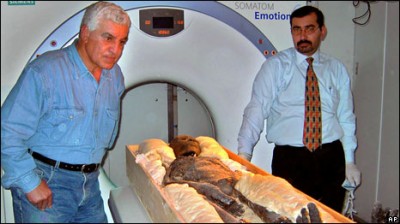(单词翻译:单击)
对话文本
Background: Tutankhamun (图坦卡蒙) 是三千年前的一位埃及法老,其墓穴中的宝藏世界闻名,不过,令专家们百思不得其解的是,为什么图坦卡蒙过世这么早,现在一项新调查对这一疑问提供了可能的答案。
【文本】
Ever since Howard Carter's discovery of Tutankhamun's tomb in the Valley of the Kings in 1922, scholars have speculated over why the 19-year-old boy king died so young.
Some believe he was killed by a fall from his chariot, conspiracy theorists say he was murdered, but scientists who painstakingly studied the pharaoh's remains think Tutankhamun died from a bout of malaria that attacked his already weakened body. They say he had a cleft palate and club foot, likely forcing him to walk with a cane.
In the journal of the American Medical Association, lead scientist Dr ZahiHawass says how he found traces of the malaria parasite in Tutankhamun's blood along with signs of bone disease. The scientists' DNA studies also suggest the true identity of the king's parents and grandparents, something that has divided archaeologists for decades.
口语突破
【口语突破】
tomb
墓穴
the Valley of the Kings
帝王谷
speculated over
揣测
chariot
(古代双轮马拉)战车
conspiracy theorists
阴谋论者
painstakingly
艰苦地
the pharaoh's remains
法老的遗骸
a bout of malaria
疟疾发作
cleft palate
腭裂
club foot
畸形足
cane
拐杖
traces of
痕迹
parasite
寄生虫
DNA
脱氧核糖核酸
divided
使意见分歧
archaeologists
考古学家
(可可英语版权所有,转载请注明出处)



